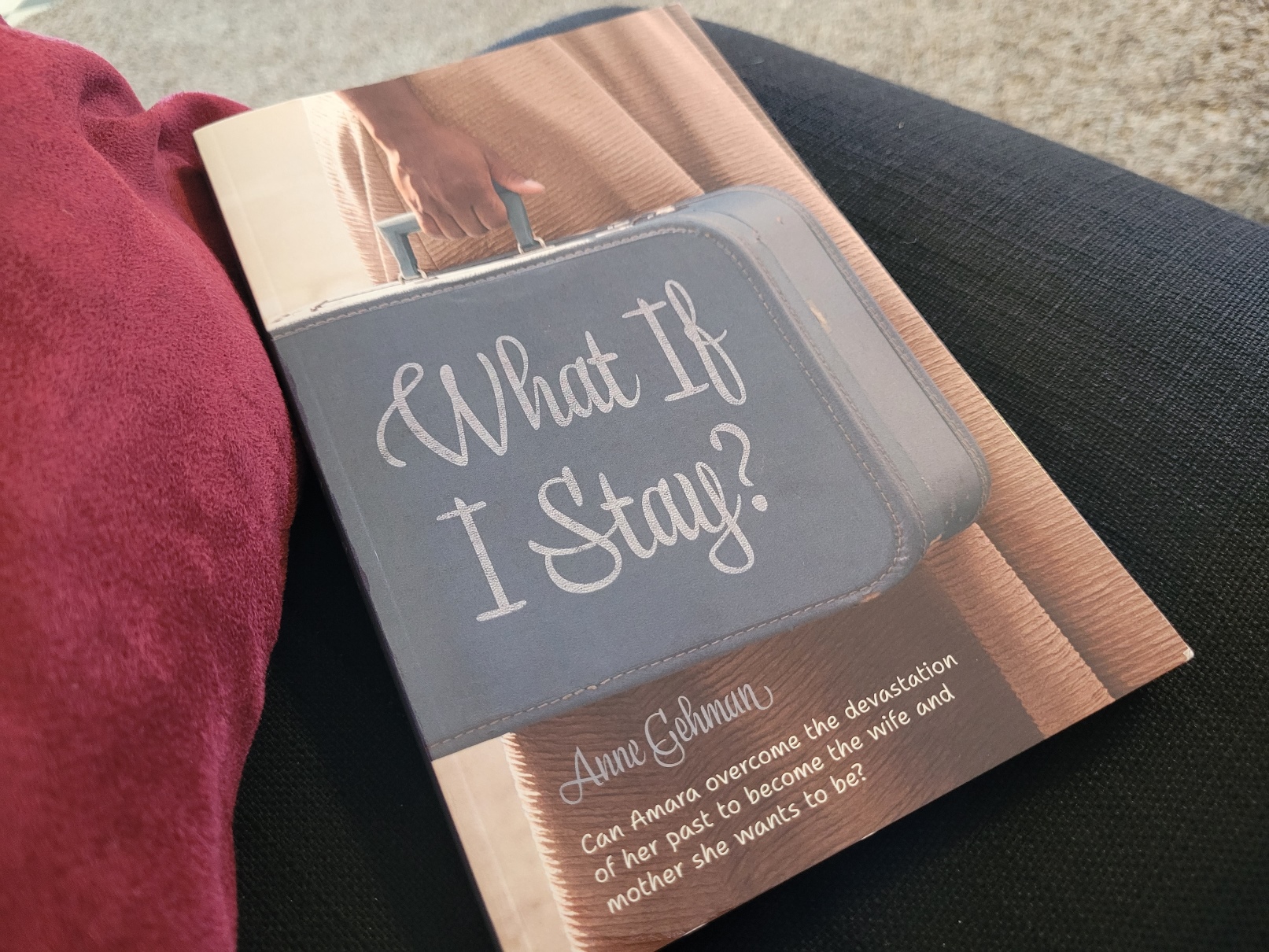Dear Anne,
Thank you for being brave and vulnerable in sharing your gift with me and with the world in What If I Stay? I was expecting nonfiction and was surprised to find a fiction story. Of course, my lingering question is How much of this is Anne’s own experience, and how much is realistic imagination? That is a question you never have to explain to anyone; it is all yours.

I liked the very human feeling of your story, the pieces of insight into how normal life feels for us all, like this section: “Amara winced and set her coffee mug down harder than she’d intended. It made an ominous cracking sound. She gingerly picked it up and surveyed it from all sides. All seemed well with the mug. Her heart, she knew, had cracked” (p. 1). It’s so relatable—as if it has happened to me too; and it has.
I like how you intersperse poetry and journaling into the story, a behind-the-scenes look into Amara’s thoughts. I liked how she reflects and dreams and overthinks; we get a lot of insight into her heart. I love that she talks to her unruly hair, and to her double chin: “You and your second and third cousins got to go because you have worn out your welcome!” (p. 128). Some insights are funny, and others bite deep: “Everything felt safer and more comfortable when her past stayed in the past” (p. 1).
The parts about childhood trauma are hard to read. For whatever part of this story is your own, I am so sorry. For whatever part is not, know that you made it believable and difficult and shattered. Thank you for revealing this, as well as for looking deeply at emotional breakdown and the devastation and hopefulness attendant in it.

One of the strongest gifts in your book is that you accept the Mennonite culture with its strengths and weaknesses for what it is. You don’t try to sugarcoat things, and you craft a wide variety of broken, well-meaning, kind, and cruel people into the tale. Is there redemption by the end? Yes, partly. But only partly. The hardnosed foster parents, Clarence and Irene, write a meaningful letter of apology. But then there is Olivia, poisonous to the end; part of the story’s resolution is Amara saying goodbye and shalom to this treacherous, condescending relationship. On the hopeful side, there is Chloe, a lovely new friend with a messy past, and the tracing of her and Amara’s tentative steps toward deepening relationship.
I like that the dissonance doesn’t all resolve. As the author, you don’t perform miracles or tie anything up with a bow. In Amara’s own words: “I guess not all stories have happy endings. Or perhaps it’s not always about happiness. Maybe it’s about surrender and peace and the willingness to move on even though it hurts excruciatingly” (p. 146). Restoration without full resolution is where we all live, if we are fortunate. Well done.

Most of all, Anne, I value and affirm your right to speak. Every human has a right to tell their story and their perspective; we silence it to our own hurt. But people with fringe insight, if I may call it that without being insensitive, bring a perspective that is essential to any group. No one else can offer it. Yours, as an adopted woman of color transplanted into a largely white, generational, and homogeneous culture, is crucial. We need to see from another’s eyes. We need to know how well we’re doing at loving and accepting—or not. You reveal key cultural weaknesses and the ways we cause discomfort and pain, but you do it with an attitude of grace, empathy, and humility. But also, group dynamics aside, you are allowed to share your heart whether or not we “need it.” Maybe you need it yourself; and that is enough. Your honesty and courage is a beautiful thing.
Here is a section that gets at what I am referencing, when Amara worries about how people see her marriage to Garrett. Your words are wistful and self-deprecating and gentle:
Amara inhaled, trying to breathe air into lungs that felt deflated. “Perhaps if I had a genuine Mennonite pedigree, I would hear things like, ‘she’ll be good for him.’ I am from a fringe of misfits; I don’t belong by birth. I should have stayed single and opened my dream coffee shop. I was doing so well fitting in, despite being a foster child, but now—well, a breakdown isn’t a huge surprise—something to add to the series of unfortunate statistics for foster/adopted/black Mennonites, I guess.”
(pp. 89-90)
Oooh, that is a painful zinger, and also helpful insight to the pressure Amara feels to make it work, to look good, and to be the success story. Thank you.

I see you crafting a story about the ability to endure hard places and see them through, Anne. The ability to walk with courage through each chapter of our stories, whether resolved or unresolved. The ability to heal, and to grow, and to stay.
Thank you for being brave.
Love and courage,
Shari
I was given a copy of What If I Stay? in exchange for my honest review. Copies are available from Christian Light Publications.

Thanks for this review, Shari! Now I must have the book.
dissonance:
: lack of agreementthe dissonance between the truth and what people want to believe
Thank you for putting a word to how I felt when I finished this book. My romantic view of foster/adoption was sorely bruised. My heart ached for Amara and the many people who are trying to fit into a predominantly white, plain culture. The book is very well written and so is your review Shari.
Thank you for sharing, Shari! Now I can’t wait to read this book!
I also appreciate the bravery of this book, Shari, and am delighted with the hope that more readers will discover Amara’s story.